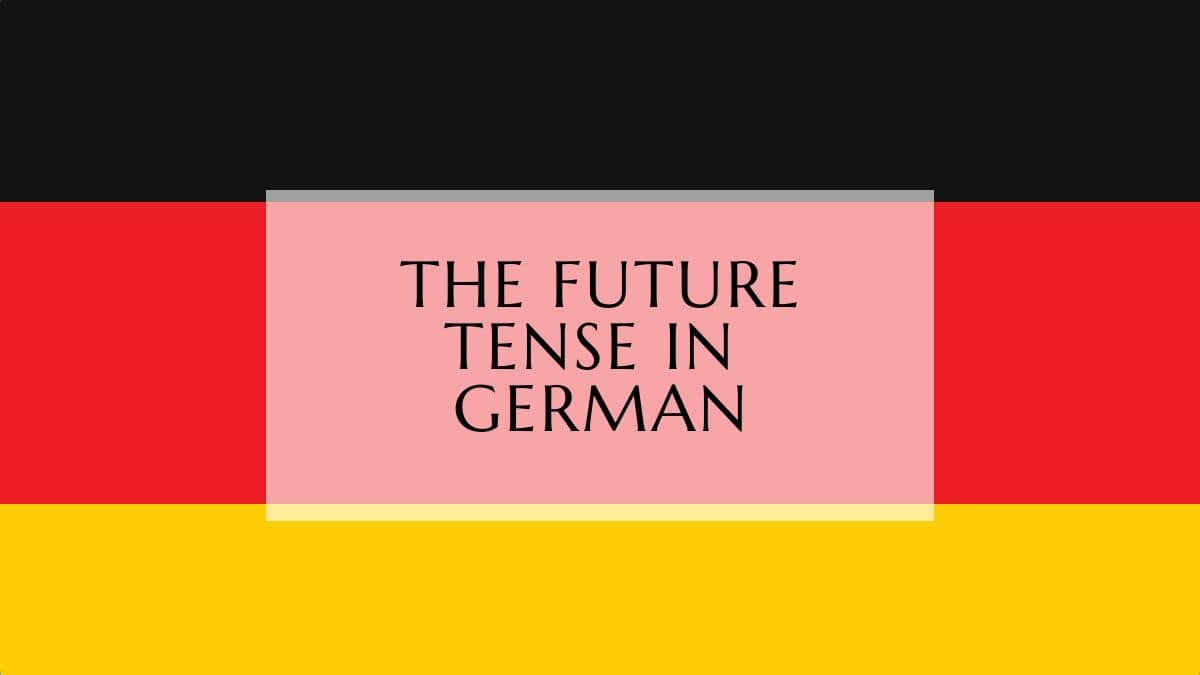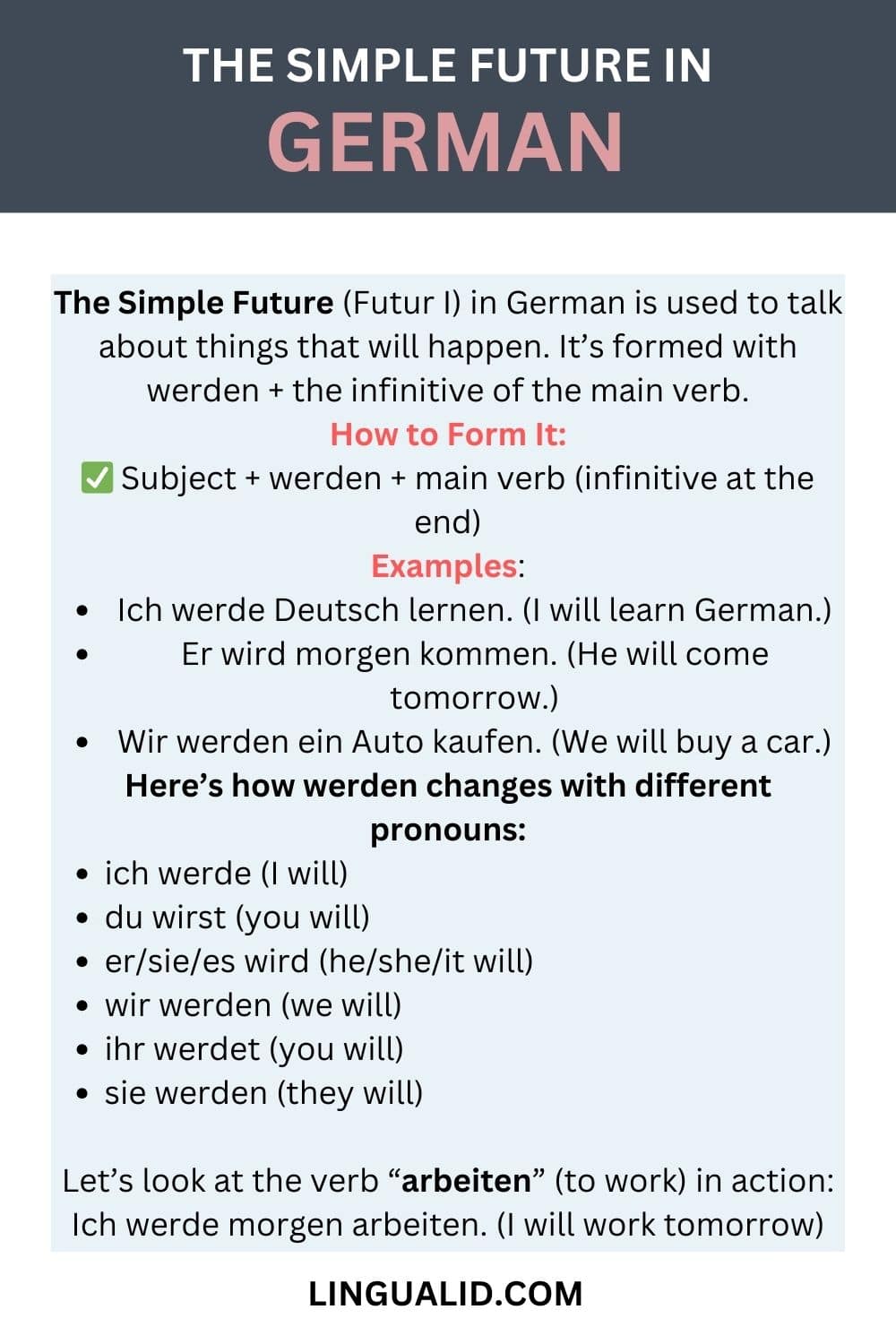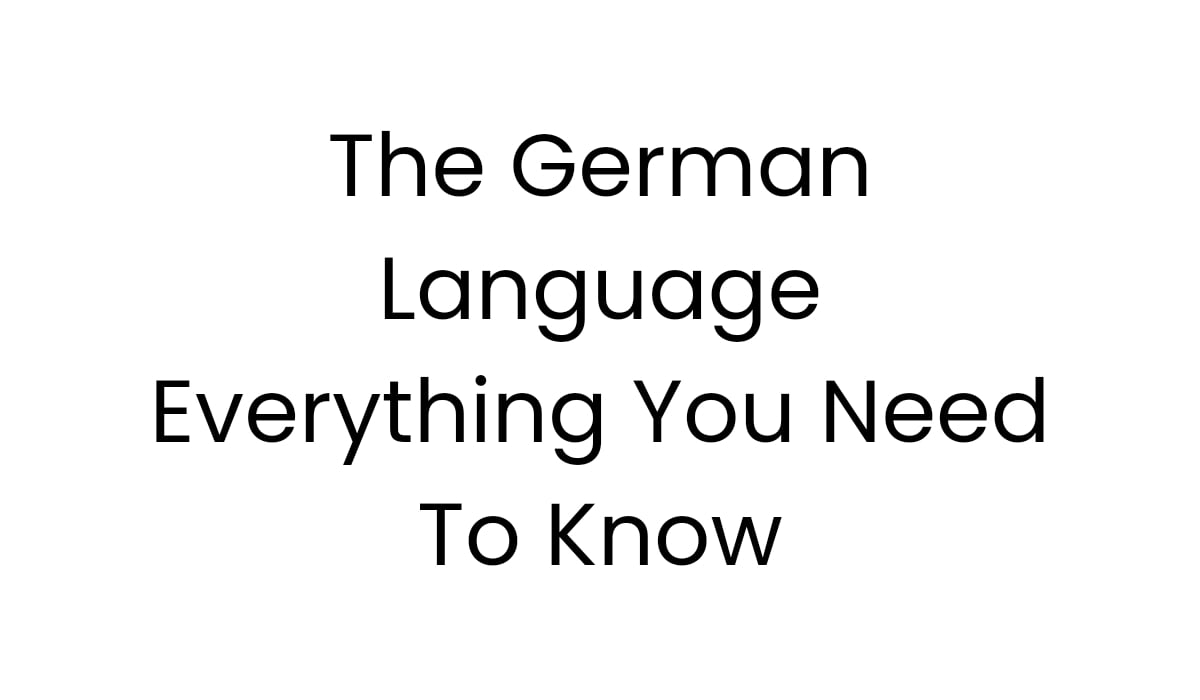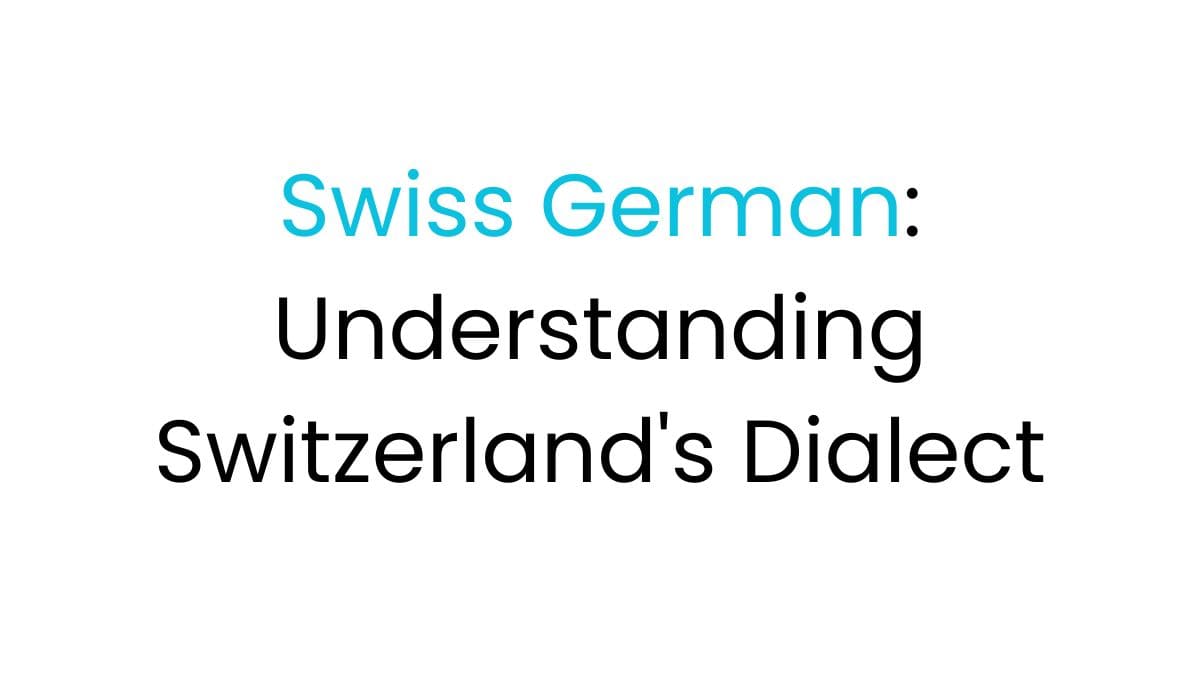Learning the Future Tense in German can really improve your language skills. It lets you talk about plans and predictions clearly. Knowing how to use the auxiliary verb werden is key to getting it right.
Many find the future tense hard, but it’s doable with the right steps. The trick is to understand how German forms future events. This involves using werden and the infinitive form of the main verb.

Key Takeaways
- Future Tense in German uses the auxiliary verb “werden” to express future actions
- The structure follows a specific pattern of werden + infinitive verb
- This tense helps express intentions, predictions, and future plans
- Conjugation of “werden” changes based on the subject of the sentence
- Practice is essential for mastering this grammatical concept
- Key Takeaways
- Basic Verb Conjugation Patterns
- Regular vs Irregular Verbs
- The Role of Auxiliary Verbs
- Present Tense Conjugation Explained
- Common Usage Patterns
- Sentence Positioning
- Using Past Participles
- Choosing Between Haben and Sein
- Word Order Rules
- Word Order Errors
- Verb Position Problems
- Auxiliary Verb Selection
- What is the basic structure of the German future tense?
- How do I conjugate the auxiliary verb "werden"?
- What's the difference between Futur I and Futur II?
- When should I use "haben" or "sein" in Futur II?
- Are there any common mistakes to avoid when using the future tense?
- Do Germans always use the future tense to talk about future actions?
- How do time expressions work with the future tense?
- Can modal verbs be used with the future tense?
- How do irregular verbs work in the future tense?
- Is the German future tense difficult to learn?
Understanding German Tenses Fundamentals
Learning German grammar means getting to know verb conjugations well. The German language has a complex system of tenses. There are six main tenses, each with its own rules and uses.
German verb conjugation patterns can be tricky for beginners. It’s all about knowing how verbs change in different situations.
Basic Verb Conjugation Patterns
To learn German conjugations, you need to spot key patterns. Regular verbs have clear rules, but irregular verbs need more attention.
- Present tense uses specific endings: -e, -st, -t, -en, -t, -en
- Simple past tense has its own patterns: -te, -test, -te, -ten, -tet, -ten
- Separable verbs have special sentence placement
Regular vs Irregular Verbs
German verbs are divided into two main groups. Regular verbs have standard rules, making them simpler. Irregular verbs, however, need to be memorized because they change in unique ways.
The Role of Auxiliary Verbs
Auxiliary verbs are key in German. They help form compound tenses and show complex relationships. The main ones are sein (to be) and haben (to have).
Grasping these basic conjugation rules is essential. Each tense has its own rules and challenges. This makes learning German a deep and rewarding journey.
Future Tense in German: Structure and Formation
Learning the Future Tense in German is about a simple yet powerful structure. The core is the auxiliary verb werden. It’s key in making future statements.
The basic structure of the Future Tense in German (Futur I) is easy:
- Conjugated form of werden + Infinitive of main verb
- Personal pronoun determines the conjugation of werden
- Infinitive always positioned at the end of the sentence
Here’s how werden changes with different pronouns:
- ich werde (I will)
- du wirst (you will)
- er/sie/es wird (he/she/it will)
- wir werden (we will)
- ihr werdet (you will)
- sie werden (they will)
Let’s look at the verb “arbeiten” (to work) in action:
- Ich werde morgen arbeiten. (I will work tomorrow)
- Du wirst nächste Woche arbeiten. (You will work next week)
German speakers often use this tense for future actions, predictions, and plans. The flexibility of werden makes talking about future events easy.
The Auxiliary Verb “Werden” and Its Conjugation
The auxiliary verb werden is key in German grammar. It helps show future actions, passive voice, and changes. Knowing how to use werden opens up new ways to communicate in German.
It’s important to learn the present tense forms of werden. Each form changes based on the subject pronoun, affecting the verb’s meaning.
Present Tense Conjugation Explained
The present tense forms of werden follow a pattern:
- ich werde (I become/will)
- du wirst (you become/will)
- er/sie/es wird (he/she/it becomes/will)
- wir werden (we become/will)
- ihr werdet (you all become/will)
- sie/Sie werden (they/formal you become/will)
Common Usage Patterns
Werden has many uses. It can show:
- Future tense
- Passive voice
- Change or transformation
Sentence Positioning
The position of werden varies with sentence structure. In future tense, it comes before the main verb, which is in infinitive form.
For example: Ich werde morgen einen Kurs besuchen (I will visit a course tomorrow). Here, werden comes before the infinitive verb.

Simple Future Tense (Futur I) Construction
Learning the Future Tense in German is key. It’s about understanding the Futur I. This helps talk about plans, guesses, and future events clearly.
The Futur I tense is easy to grasp. It’s made by adding werden (conjugated) to the main verb’s infinitive form. This makes it easy to talk about what might happen next.
- Key components of Futur I:
- Helping verb werden (conjugated)
- Main verb in infinitive form
Now, let’s look at how to build a Futur I sentence:
- Werden always comes second
- The main verb goes at the end
- You can add words like “morgen” or “nächstes Jahr”
Here are some examples of using the Future Tense in German:
- Ich werde morgen ins Kino gehen (I will go to the cinema tomorrow)
- Sie wird wahrscheinlich studieren (She will probably study)
It’s interesting to note that Germans sometimes use the present tense for future plans. This shows how flexible German grammar can be.
Future Perfect (Futur II) Formation
Understanding the Future Perfect (Futur II) tense in German is key. It lets speakers talk about actions that will be done by a certain time in the future.
The Future Perfect tense has its own rules and uses special verbs. Let’s look at what makes up this complex German tense.
Using Past Participles
Past participles are important for Futur II. They change based on the verb type:
- Weak verbs: Form with “ge…t” (e.g., lernen – gelernt)
- Strong verbs: Form with “ge…en” (e.g., sehen – gesehen)
- Mixed verbs: Use “ge…t” (e.g., denken – gedacht)
Choosing Between Haben and Sein
Choosing the right auxiliary verb is crucial. It depends on the verb’s nature:
- Use haben for most verbs that describe a completed action
- Use sein for verbs indicating movement or change of state
Word Order Rules
The Futur II structure has specific word order rules:
- Start with the conjugated form of werden
- Place the past participle next
- End with the appropriate auxiliary verb (haben or sein)
Example: Ich werde die Arbeit beendet haben (I will have finished the work)
Related post: The Future Perfect in German (Futur II)
Time Expressions and Future Tense
Learning time expressions is key when you’re studying the future tense in German. These expressions help you say exactly when something will happen. They make your messages clear and precise.
German has many time expressions to help you talk about the future. They are important for setting the time of future actions. This makes your messages clear and easy to understand.
- Morgen (tomorrow)
- Nächste Woche (next week)
- In zwei Tagen (in two days)
- Bald (soon)
- Übermorgen (day after tomorrow)
In German, time expressions work differently with Futur I and Futur II. They help you make more detailed plans for the future. Where you put these expressions can change how your sentence sounds.
| Time Expression | English Translation | Usage Context |
|---|---|---|
| Um zehn Uhr | At ten o’clock | Specific time reference |
| Jeden Tag | Every day | Recurring action |
| Von Montag bis Freitag | From Monday to Friday | Time range |
When you’re talking in a professional or casual setting, you need to use time expressions differently. In formal talks, being exact with time is very important. It helps avoid confusion. It’s good to practice using these expressions in your German conversations.
Common Mistakes and How to Avoid Them
Learning German grammar can be tough, especially the future tense. Even those who know a lot can still get things wrong. These mistakes can make talking in German hard.
Knowing what mistakes to avoid can really help. Let’s look at the most common errors in using the future tense.
Word Order Errors
German sentence order is different from English. In the future tense, where you put the verb is very important. Students often get this wrong.
- Placing the main verb in the wrong position
- Misunderstanding clause-end verb placement
- Mixing subordinate and main clause word orders
Verb Position Problems
The German verb system is complex. It needs exact verb placement. Students face a few big challenges.
- Incorrect positioning of infinitive verbs
- Misplacing auxiliary verbs
- Failing to follow strict German syntax rules
Auxiliary Verb Selection
Choosing between haben and sein can be tricky. Here’s a quick guide:
| Verb Type | Auxiliary Verb | Example |
|---|---|---|
| Movement Verbs | Sein | Ich werde nach Berlin fahren |
| State Change Verbs | Sein | Er wird alt werden |
| Other Verbs | Haben | Ich werde ein Buch lesen |
By understanding these common mistakes, learners can get better at German. They can talk more confidently.
Practical Examples and Usage Scenarios
Learning the Future Tense in German is easier when you see how it’s used in real life. It helps express plans, predictions, and possibilities. Students can use Futur I and Futur II to talk about future events clearly.
Modal verbs add depth to future statements. For example, saying “I will study German next semester” shows a clear plan. This way, speakers can talk about what might happen next.
In everyday life, the Future Tense in German is very useful. At work, you might say, “Ich werde die Präsentation vorbereiten” (I will prepare the presentation). In casual talks, saying “Ich werde dich anrufen” (I will call you) is common. The Future Perfect tense is also useful for talking about actions that will be done by a certain time.
Practicing is essential to get the hang of these grammar rules. Listening to native speakers and talking with them helps a lot. The more you use these rules, the more natural they become.
FAQ
What is the basic structure of the German future tense?
How do I conjugate the auxiliary verb “werden”?
What’s the difference between Futur I and Futur II?
When should I use “haben” or “sein” in Futur II?
Are there any common mistakes to avoid when using the future tense?
Do Germans always use the future tense to talk about future actions?
How do time expressions work with the future tense?
Can modal verbs be used with the future tense?
How do irregular verbs work in the future tense?
Is the German future tense difficult to learn?
Oualid Cheddadi is the founder of Lingualid, a platform that inspires independent language learners worldwide, regardless of the language they are learning. The name “Lingualid” is derived from the Portuguese word for “language,” “língua,” and the last three letters of Oualid’s name, “Lid.”



